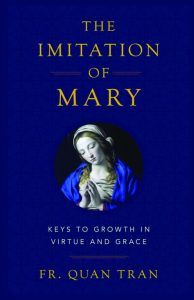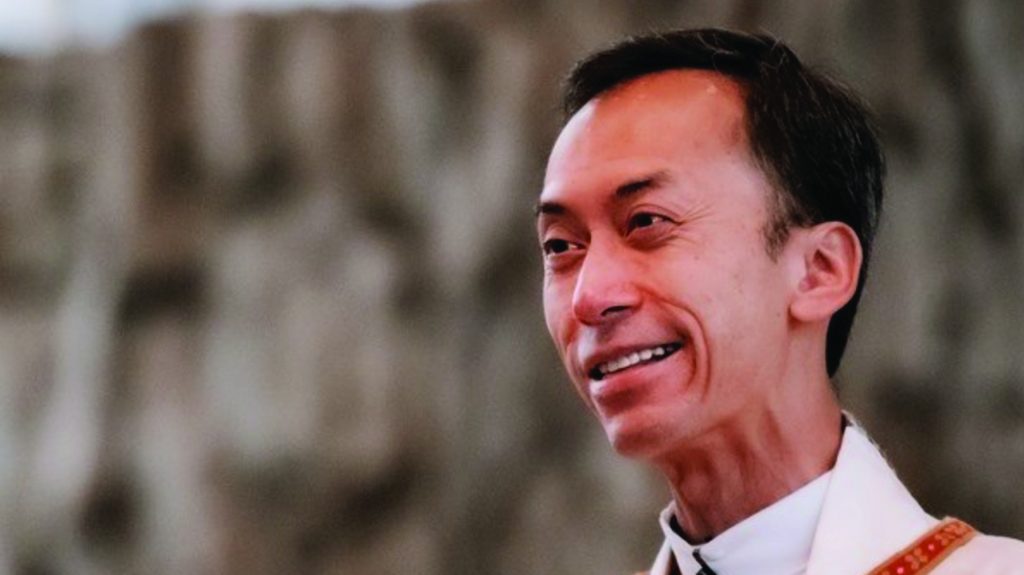After obtaining all the outward signs of success, Orange County Deputy District Attorney Father Quan Tran felt something was missing.
Raised in what he acknowledges as a “lukewarm Catholic family,” his then girlfriend suggested he come to Sunday Mass with her. Through praying the rosary, going to daily Mass, and attending eucharistic adoration, he grew into a deep devotion to the Blessed Virgin Mary. His entire life changed, his faith blossomed, and he recognized his call to the priesthood.
In “The Imitation of Mary: Keys to Growth in Virtue and Grace,” (Sophia Institute Press, $17), Father Tran shares what he has learned and how it can help us be better disciples in the world.
KRIS MCGREGOR: Don’t we need to take to heart the last words of the Blessed Virgin Mary in the Scriptures, “Do whatever he tells you”?
FATHER QUAN TRAN: Yes. That’s the secret of sanctity.
So many of the saints speak about conforming our will to God’s. Mary did that perfectly. Jesus did that perfectly. Many of the saints did that perfectly. And yet, it’s so difficult for us to do that.

MCGREGOR: So many are extremely anxious and fearful, including many Catholics, because of their concern for the world today. Many are asking “What can we do?” And the answer, of course, is that you have to pray and listen, but you also have to love.
FATHER TRAN: Right. I think our culture doesn’t really know what love means, because we hear that word thrown around and misused. And so it’s understandable why people roll their eyes when offered as a solution.
But if you really understand the definition of love, you’ll have a better appreciation for it. St. Thomas Aquinas tells us, “To love is to will the good of the other.”
I break love down into three qualities. First is sacrifice. It’s easy to say, “I love you,” but we really have to show it, demonstrate it by sacrificing for the good of the other, just like Jesus sacrificed himself for our salvation. If we are to love God and others, we need to sacrifice something valuable: our time, our energy, for the good of the other.
The second part is self-forgetfulness, which is close to sacrifice. As a culture, as a world, we’re self-centered. Jesus, Mary, and the saints, they forget themselves in thinking of the good of the other.
The last part is acceptance. We have to accept that people may not appreciate what we do for them, the sacrifice we make for them; they may even hate us. But I go back to what “good” really means. There are different levels of good, but the greatest good is sanctity, holiness, eternal life.
Sometimes we think, if you love somebody, then you just go along with what they want and to support them no matter what. But that’s not true love. True love is the desire to will the greatest good of the other, which is their eternal salvation. Sometimes you have to say no, or go against them, if what they’re doing or what they want is not conducive to their greatest good, which is heaven.
MCGREGOR: We’re called to learn this from Our Lady because she was able to do what many of us find almost impossible — to freely love and give.
FATHER TRAN: She lived in our world, she was a human being just like us. She had to deal with annoyances, sin, disappointments, challenges, suffering. She wasn’t immune to any of that. In fact, she probably suffered more than all of us ever will.
Mary had complete free will, but she chose to respond in love and sacrifice. She is our perfect model. Jesus is God and man, and of course he is the most perfect, but Mary is the closest to him. And in a way, some of us may be able to relate more to Mary. I know I did when I was going through my conversion.
I felt her motherly care and her closeness. Jesus can be a little intimidating because he is God and man, but Mary is just human. She is a blessed human, but human nonetheless.
Mary can help us to be less intimidated, in trying to imitate her. I see so many people striving for holiness, but they miss a lot of things. They have these obstacles that they don’t realize.
I know some people who are constantly checking their phones, it’s just become a habit, browsing the internet, getting on social media. That constant distraction is preventing them from growing in holiness, from achieving this fullness of grace and entering into a deeper relationship with Jesus.
And then so many people struggle with lust. In our society now, there are so many images everywhere. Many of us are so careful about what we eat, but we just expose ourselves to these horrific, damaging images and videos, and we don’t think much about it. We have to take custody of our eyes and ears.
We need to eliminate these obstacles, close the doors to evil and sin that seeps into our lives and prevents us from growing in perfection.
MCGREGOR: We have to learn how to model Mary’s fiat, her yes.
FATHER TRAN: It all goes back to free will. God gave us free will, and it’s how we use it that’s going to direct our life, our spiritual life.
Mary used her free will perfectly. She could always say no. And you could always say no. But she always said yes, with love, with faith and abandonment.
MCGREGOR: This is really a “self-help” book — how to say yes and allow God to help you!
FATHER TRAN: It’s spiritual self-help, to help people respond to God’s grace by imitating Mary, so we may have this fullness of life.
Jesus gave us Mary as a bridge to him, to help us get closer to him, and we need all the help we can get. Mary is a powerful help. Why not take advantage of it? Why reject it?
That’s why God gave us Mary, to be our mother and our model.
To hear the full conversation, visit discerninghearts.com.

